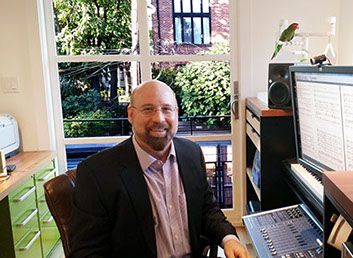For Whom the Bell Tolls
A New Opera in Two Acts
Music by Brian Wilbur Grundstrom
Libretto by David Dorsen
Book by Ernest Hemingway
![]() Brian Wilbur Grundstrom has written an opera to Ernest Hemingway’s For Whom the Bell Tolls. The libretto by David Dorsen is finished, and contains six scenes in two acts. Act I scene 3 was professionally recorded. As the composer is not widely known, this recording is instrumental in obtaining a full commission, and marketing to potential donors. Ideally, a co-production with multiple opera companies would provide for shared expenses and greater exposure.
Brian Wilbur Grundstrom has written an opera to Ernest Hemingway’s For Whom the Bell Tolls. The libretto by David Dorsen is finished, and contains six scenes in two acts. Act I scene 3 was professionally recorded. As the composer is not widely known, this recording is instrumental in obtaining a full commission, and marketing to potential donors. Ideally, a co-production with multiple opera companies would provide for shared expenses and greater exposure.
An attorney who has written an award-winning biography of Henry Friendly, one of the great judges of the 20th century, David Dorsen choose Grundstrom to compose music to his libretto.
Hemingway (1899-1961) has earned a place in American culture, and his For Whom the Bell Tolls remains current today. As per the Hemingway estate, there has never been an opera based on a novel by Hemingway. Set in the important historic period of the Spanish civil war during the late 1930’s, the novel explores the first direct confrontation between the two main negative forces in the 20th century -- communism and fascism. The story lends itself well to an opera, providing many opportunities for great music, with passion, betrayal, reconciliation, sacrifice, humor, and more. The leading characters are powerful: Robert Jordan (tenor) is the American directed by the Russians to enlist a local band of guerillas to blow up a bridge; Pablo (baritone) is the former leader of the band who betrays the others by throwing away the detonators for the dynamite; the domineering Pilar (dramatic mezzo) is Pablo’s wife and has taken control of the band; and Maria (lyric soprano), who has been rescued by the band and represents lost innocence, falls in love with Jordan. The powerful anti-war message resonates with today’s audience, and is worthy of exploration.
Designed to be performed on a relatively modest budget, there is no chorus, elaborate scenery or costumes. In addition to the four leads, there are only four singing men in Pablo's band. The orchestration has been kept small for affordability, and includes 2 flutes, 2 oboes, 2 clarinets, 2 bassoons, 2 trumpets, 2 horns, 2 trombones, timpani, percussion, harp and strings (4,4,4,3,2).
The recording took place at Omega Studios near DC. Their large studio was sufficient to hold the 35 members of the orchestra. The vocalists were in an isolation booth for more control. The studio has recorded operas before and is known as one of the best in the Washington DC area.
Synopsis
Robert Jordan, an American, is sent to join Pablo's band of guerrillas, who are fighting with the Communists and who are housed in a cave. His task is to blow up a bridge at the start of surprise major offensive with the help of the band. He meets Pilar, Pablo's wife and a formidable figure in her own right, and Maria, a young woman whom the band recently rescued from the fascists in a recent raid after she was raped and otherwise abused. Pablo was a brave commander, but has taken to drinking and has become cautious. They learn that there is gossip in the city about the impending raid, which means that the element of surprise has been lost. The band is visited by the head of a nearby band, El Sordo, who then returns to his place in the mountains. With the agreement of the other members of Pablo's band, Pilar wrests the leadership of the band from a furious Pablo. Jordan and Maria were smitten at first meeting, and at the end of Scene Two she joins him in his sleeping bag outside the cave. Act I, Scene Three, follows.
Act II starts with German planes flying over the cave on their way to destroy El Sordo and his band. Pilar tells Jordan that Pablo has disappeared, taking a horse and the detonators for the dynamite. Pablo reappears and announces that he has decided to rejoin the band. He has thrown away the detonators, so Jordan will have to improvise. Pablo goes out to try to find more men and horses. He returns successfully and they bomb the bridge, but suffer a number of fatalities, although the four principals survive. One by one the remaining members of the group race across a road on their way to safety. Jordan alone is shot and seriously injured. He is left behind with a machine gun to delay the fascists while the others, including a distraught Maria, make their escape.
ALL MUSIC © 2016 Brian Wilbur Grundstrom
© 2016 NAVONA RECORDS LLC. ALL RIGHTS RESERVED.
Navona Records offers listeners a fresh taste of today's leading innovators in orchestral, chamber, instrumental, and experimental music as well as prime pieces of classic repertoire. Our music is meticulously performed by the finest musicians and handpicked to ensure the most rewarding listening experience.
223 Lafayette Road
North Hampton NH 03862
PRESS INQUIRIES
press (at) parmarecordings.com
603.758.1718 x 151
